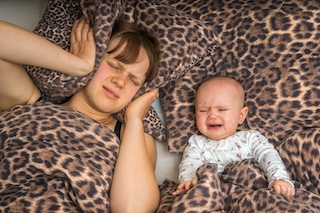 Every parent knows the feeling of not getting enough sleep. A newborn requires around-the-clock care and that means feedings as frequent as hourly all through the night leaving little time for mom or dad to catch up on some much needed rest. The advice is to sleep when the baby sleeps but how much of an impact does frequent interrupted sleep have on the mental health of new parents? And are there other factors besides caring for a newborn that could be causing poor sleep quality in pregnant and postpartum moms?
Every parent knows the feeling of not getting enough sleep. A newborn requires around-the-clock care and that means feedings as frequent as hourly all through the night leaving little time for mom or dad to catch up on some much needed rest. The advice is to sleep when the baby sleeps but how much of an impact does frequent interrupted sleep have on the mental health of new parents? And are there other factors besides caring for a newborn that could be causing poor sleep quality in pregnant and postpartum moms?
Up to 20 per cent of new moms suffer from postpartum depression and anxiety. Infants as well as women and men are negatively affected as a result. Ninety per cent of people with depression and 70 per cent of people with anxiety suffer from poor sleep quality.
According to a new study published in Journal of Behavioral Medicine, poor sleep quality increases symptoms of anxiety and depression in postpartum women. One hundred and sixteen women from the Los Angeles and Denver area participated in the study. Data was obtained for the women during the second trimester of pregnancy and six months postpartum.
“Sleep is an extremely important health behavior that is often taken for granted or ignored,” study author Michele L. Okun told us. “To determine if a modifiable behavior (sleep) is linked to depression and anxiety (major health issues for women) could lead to interventions.”
Studies have shown that sleep disturbances can either trigger anxiety and depression symptoms as well as the opposite in that depression and anxiety can result in poor sleep. Okun and colleagues Roberta A. Mancuso, Calvin J. Hobel, Christine Dunkel Schetter and Mary Coussons-Read were interested in further examining how sleep quality and the subjective rating of one’s sleep, impacts symptoms of anxiety and depression during the postpartum period. This association has been found in a handful of studies so this was a confirmation study, notes Okun.
“We had the hypothesis that bad sleep quality would be associated with more depressive and anxiety symptoms,” Okun told us. Okun has been studying the effect of poor sleep in perinatal women for about 20 years. "There is so much that happens during pregnancy and postpartum that can impact both the mother and her child.”
Researchers tested their theory by collecting questionnaire data from the 18-question Pittsburgh Sleep Quality Index which assessed habitual sleep over the previous month and depressive and anxiety symptoms. The questionnaire looked at sleep quality as well as sleep disturbances and daytime dysfunction.
Okun wasn’t surprised by the results.
"We found that poor sleep quality is associated with more depressive and anxiety symptoms in the postpartum period," Okun told us. “This association is being confirmed among many cohorts of women around the world.”
Okun and fellow researchers hope questions about sleep will become the norm during clinic check-ups.
“Clinicians ask about drinking, eating and exercise, but they sorely neglect sleep," Okun told us. "It is a modifiable behavior that is likely to have significant positive benefits to health and outcomes if treated.”
While the most commonly-held assumption is that a new mother isn’t getting enough sleep because she’s up frequently during the night looking after her infant, poor sleep can also be caused by inflammation and hormonal dysregulation. The authors of the study concluded that their findings indicate the need for future research on whether interventions such as cognitive behavioral therapy and meditation might be useful to improve sleep disturbances in new moms.
Patricia Tomasi is a mom, maternal mental health advocate, journalist, and speaker. She writes regularly for the Huffington Post Canada, focusing primarily on maternal mental health after suffering from severe postpartum anxiety twice. You can find her Huffington Post biography here. Patricia is also a Patient Expert Advisor for the North American-based, Maternal Mental Health Research Collective and is the founder of the online peer support group - Facebook Postpartum Depression & Anxiety Support Group - with over 1500 members worldwide. Blog: www.patriciatomasiblog.wordpress.com
Email: tomasi.patricia@gmail.com